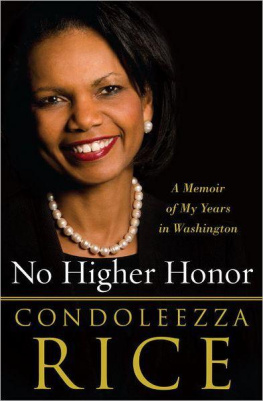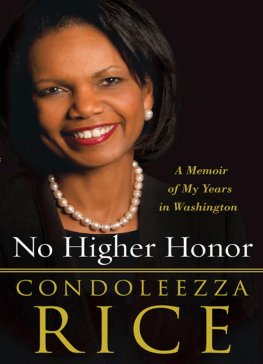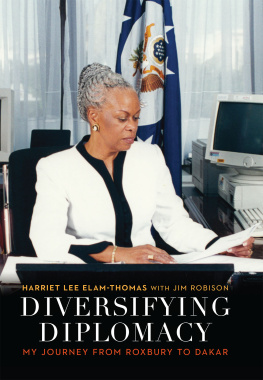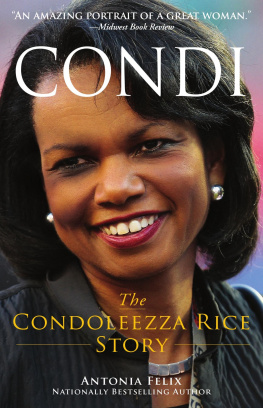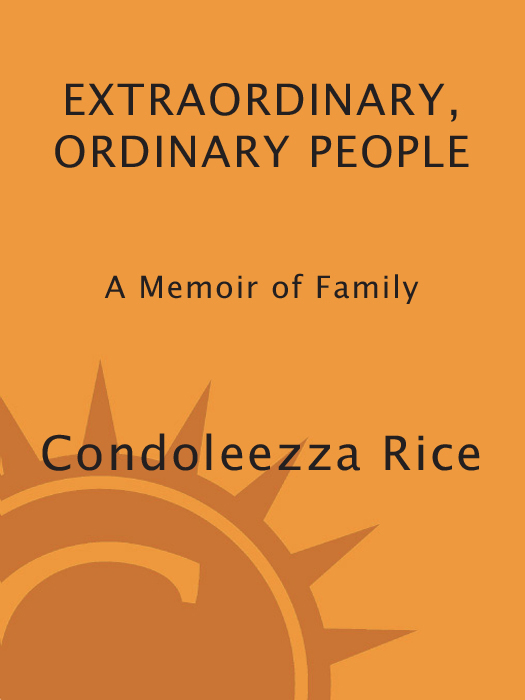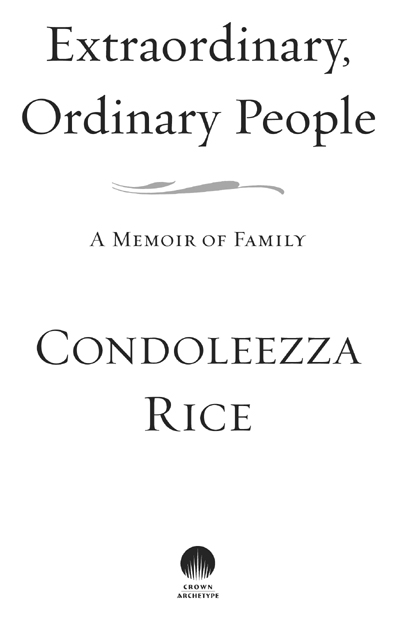Copyright 2010 by Condoleezza Rice
All rights reserved.
Published in the United States by Crown Archetype, an imprint of the Crown Publishing Group, a division of Random House, Inc., New York.
www.crownpublishing.com
Crown Archetype with colophon is a trademark of Random House, Inc.
Grateful acknowledgment is made to the following for permission to reprint previously published material:
Alfred Publishing Co., Inc.: Lyrics from Take My Hand, Precious Lord, words and music by Thomas A. Dorsey, copyright 1938 (Renewed) by Warner-Tamerlane Publishing Corp. All rights reserved. Reprinted by permission of Alfred Publishing Co., Inc.
Hal Leonard Corporation: Lyrics from Theme from The Greatest American Hero, from the television series, words by Stephen Geyer, music by Mike Post, copyright 1981 by EMI Blackwood Music Inc., Dar-Jen Music, EMI April Music Inc. and Stephen Cannell Music. All rights for Dar-Jen Music controlled and administered by EMI Blackwood Music Inc. All rights reserved. International copyright secured. Reprinted by permission of Hal Leonard Corporation.
Library of Congress Cataloging-in-Publication Data
Rice, Condoleezza, 1954
Extraordinary, ordinary people : a memoir of family / Condoleezza Rice.1st ed.
1. Rice, Condoleezza, 1954Childhood and youth. 2. Rice, Condoleezza, 1954Family. 3. African American familiesAlabamaBirmingham. 4. African AmericansAlabamaBirminghamBiography. 5. Birmingham (Ala.)Biography. 6. Birmingham (Ala.)Race relationsHistory20th century. 7. StateswomenUnited StatesBiography. 8. Women cabinet officers United StatesBiography. 9. African American womenBiography. I. Title.
E 840.8. R 48 A 3 2010
327.730092dc22
[ B ] 2010021645
eISBN: 978-0-307-71960-7
Unless otherwise indicated, all photographs are courtesy of the Rice Family Collection.
v3.1
To my parents,
J OHN AND A NGELENA R ICE ,
and my grandparents:
M ATTIE AND A LBERT R AY ,
and
J OHN AND T HERESA R ICE
C ONTENTS
T WENTY Rally, Sons (and Daughters) of
Notre Dame
T HIRTY I Dont Think This Is What
Karl Marx Had in Mind
A UTHORS N OTE
J OHN AND Angelena Rice were extraordinary, ordinary people. They were middle-class folks who loved God, family, and their country. I dont think they ever read a book on parenting. They were just good at itnot perfect, but really good. They loved each other unreservedly and built a world together that wove the fibers of our lifefaith, family, community, and educationinto a seamless tapestry of high expectations and unconditional love. And somehow they raised their little girl in Jim Crow Birmingham to believe that even if she couldnt have a hamburger at the Woolworths lunch counter, she could be President of the United States.
As it became known that I was writing a book about my parents, I received many letters and emails from people who knew my mom and dad, telling me how my parents had touched their lives. In conducting this journey into the past I had the pleasure of returning to the places my parents lived and talking with their friends, associates, and students.
I was also contacted by people who didnt know my parents but recognized in my story their own parents love and sacrifice. Good parents are a blessing. Mine were determined to give me a chance to live a unique and happy life. In that they succeeded, and that is why every night I begin my prayers saying, Lord, I can never thank you enough for the parents you gave me.
C HAPTER O NE

Starting Early
M Y PARENTS were anxious to give me a head start in lifeperhaps a little too anxious. My first memory of confronting them and in a way declaring my independence was a conversation concerning their ill-conceived attempt to send me to first grade at the ripe age of three. My mother was teaching at Fairfield Industrial High School in Alabama, and the idea was to enroll me in the elementary school located on the same campus. I dont know how they talked the principal into going along, but sure enough, on the first day of school in September 1958, my mother took me by the hand and walked me into Mrs. Jones classroom.
I was terrified of the other children and of Mrs. Jones, and I refused to stay. Each day we would repeat the scene, and each day my father would have to pick me up and take me to my grandmothers house, where I would stay until the school day ended. Finally I told my mother that I didnt want to go back because the teacher wore the same skirt every morning. I am sure this was not literally true. Perhaps I somehow already understood that my mother believed in good grooming and appropriate attire. Anyway, the logic of my argument aside, Mother and Daddy got the point and abandoned their attempt at really early childhood education.
I now think back on that time and laugh. John and Angelena were prepared to try just about anythingor to let me try just about anythingthat could be called an educational opportunity. They were convinced that education was a kind of armor shielding me against everythingeven the deep racism in Birmingham and across America.
They were bred to those views. They were both born in the South at the height of segregation and racial prejudiceMother just outside of Birmingham, Alabama, in 1924 and Daddy in Baton Rouge, Louisiana, in 1923. They were teenagers during the Great Depression, old enough to remember but too young to adopt the overly cautious financial habits of their parents. They were of the first generation of middle-class blacks to attend historically black collegesinstitutions that previously had been for the children of the black elite. And like so many of their peers, they rigorously controlled their environment to preserve their dignity and their pride.
Objectively, white people had all the power and blacks had none. The White Man, as my parents called them, controlled politics and the economy. This depersonalized collective noun spoke to the fact that my parents and their friends had few interactions with whites that were truly personal. In his wonderful book Colored People, Harvard Professor Henry Louis Skip Gates Jr. recalled that his family and friends in West Virginia addressed white people by their professionsfor example, Mr. Policeman or Mr. Milkman. Black folks in Birmingham didnt even have that much contact. It was just The White Man.
Certainly, in any confrontation with a white person in Alabama you were bound to lose. But my parents believed that you could alter that equation through education, hard work, perfectly spoken English, and an appreciation for the finer things in their culture. If you were twice as good as they were, they might not like you but they had to respect you. One could find space for a fulfilling and productive life. There was nothing worse than being a helpless victim of your circumstances. My parents were determined to avoid that station in life. Needless to say, they were even more determined that I not end up that way.
My parents were not blue bloods. Yes, there were blue bloods who were black. These were the families that had emerged during Reconstruction, many of whose patriarchs had been freed well before slavery ended. Those families had bloodlines going back to black lawyers and doctors of the late nineteenth century; some of their ancestral lines even included political figures such as Hiram Rhodes Revels, the first black United States senator. There were pockets of these families in the Northeast and a large colony in Chicago. Some had attended Ivy League schools, but others, particularly those from the South, sent their children to such respected institutions as Meharry Medical College, Fisk, Morehouse, Spelman, and the Tuskegee Institute. In some cases these families had been college-educated for several generations.


